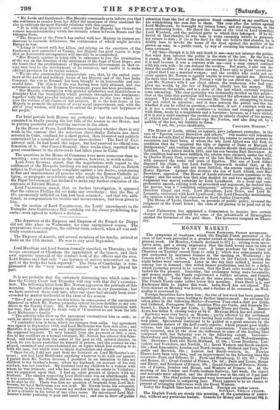It is not probable that the extremely distressing case which
came be- fore the County Court lass Thursday will stop with that day's examina- tion. The following letter from Mrs. Norton appears in the journals of this morning. Several other papers on the subject are in our possession ; but we have received them very late, after our space had already been over- crowded by matter incidental to the close of the session.
"Sir—I ask your patience for this letter, in consequence of the unexpected falsehood on which Mr. Norton yesterday upheld his non-liability to my cre- ditors in the County Court. Mr. Norton then declared his stipulation with ins was, that he should be liable only if 'I received no aid from the late Lord Melbourne's family.' "The solicitor who drew up the agreement contradicted him an oath ; on oath he stated there was no such stipulation.
"I contradict him in facts, which are stronger than oaths. Our agreement was signed in September 1848, and Lord Melbourne was then still alive ; and therefore it is impossible any such stipulation should have been made as to his supposed bequests. To save himself from the payment of 5001. a year, due to my creditors on a formal covenant, Mr. Norton has uttered this false- hood, and raked up from the ashes of the past an old, refuted slander, on which for two hours yesterday he himself in person, and the counsel he em- ployed, examined and cross-examined me on topics which had nothing to do with the case, but which were to imply degradation and shame. "Ones for all, I did not part from my husband on Lord Melbourne's ac- count nor had Lord Melbourne anything whatever to do with our quarrel. I parted from Mr. Norton because I persisted in an intention to take my children to my brother's house, where my husband, on account of his own conduct, was not received. My husband sent my children to a woman with whom he was intimate, and who has since left him an estate in Yorkshire; and we separated upon that. I had no other ground of dispute with my husband. The slander respecting Lord Melbourne was an afterthought. So it was yesterday. Mr. Norton did not make any such stipulation with me as he says he did. There was then no question of bequests from Lord Mel- bourne, for Lord Melbourne was not dead. Mr. Norton broke his covenant, according to his own letter, because my mother left me an annuity. There is not a syllable in his letter of any other cause. He introduced Lord Mel- bourne's name yesterday to pain and insult me ; and also to draw off public attention from the fact of the positive fraud committed on my creditors by his withholding the sum due to them. The year after the action against Lord Melbourne, he besought my return home, and my forgiveness in the most endearing terms. Be threw the blame a the tnal on Lord forgiveness, Lord Wynford, and the political party to which they belonged. If he be- lieved in that slander, he was base to write caressing letters to persuade my return to him ; if (as is the fact) he did not believe that slander, he is doubly base to invoke the name of the dead against the mother of his grown-up sons, in a public court, by way of excusing his violation of a so- lemn covenant.
"All this—though it is life and death to m—may not interest the public. But what does interest the public is the state of the law. By the law as it stands, if Mr. Norton can evade his covenant (as he does) by stating that it is null because it was a contract with me—and a man cannot contract with his own wife—he can defraud the creditor. But mark, I also can de- fraud the creditor ; for if a creditor sues me, I have only to plead coverture' "—plead that I am a married woman ; and the creditor who could not re- cover against Mr. Norton is equally unable to recover against me. Between the facts that because I am Mr. Norton's wife he can cheat me, and because I am Mr. Norton's wife I can cheat others, the tradesman who had sup- plied me would, by the law of England, utterly lose his money. This does interest the public, and is a state of the law which certainly requires some amending. The case yesterday was technically decided on this point— that at the time this particular bill was incurred the allowance had not been stopped. The validity of the covenant Mr. Norton is attempting to break was not called in question ; and it does interest the public and the bar whether it can be called in question,—whether, if not a contract with me, it is not a contract with my creditors—a written and stamped agreement with them, made by a magistrate and a barrister; because, as I have stated, if it is not a valid contract the creditor may be utterly cheated of his money, if (which God forbid !) I should copy Mr. Norton, and also fling off, by a quibble of the law, my liability to them. "I am, Sir, yours obediently, CAROLINE Nonrois."


























 Previous page
Previous page